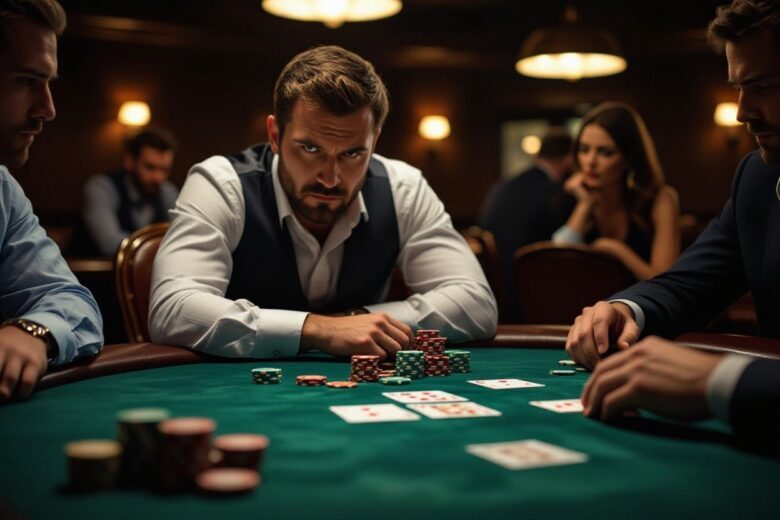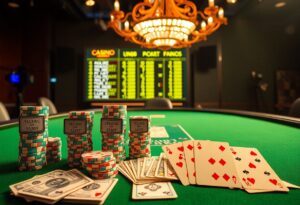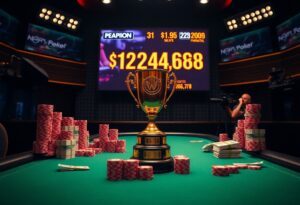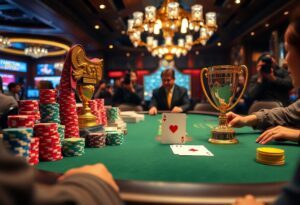Confidence is important in poker, but letting your ego take control can be your biggest downfall at the table. When you allow pride to cloud your judgment, you’re more likely to make emotionally-driven decisions rather than logical ones. Your ego might push you to chase losses, overvalue your hand strength, or refuse to fold against clearly superior holdings. This destructive mindset not only depletes your bankroll but also prevents you from learning from your mistakes and adapting your strategy. By keeping your ego in check, you can maintain objective decision-making and improve your long-term poker success.
The Ego Trap: How It Impacts Decision-Making
Your ego creates a dangerous filter that distorts rational poker decision-making. When ego takes over, you start making plays to prove yourself right rather than maximize profit. This leads to calling too many bluffs, refusing to fold strong hands, and playing above your bankroll – all because you’re more focused on protecting your self-image than playing optimal poker.
Cognitive Biases Influencing Risk Assessment
An inflated ego amplifies cognitive biases that skew your risk perception at the table. You’ll overestimate your edge in marginal spots, dismiss valid threats from opponents you view as “lesser players,” and rationalize poor decisions through selective memory. These ego-driven biases make you blind to your actual skill level and prevent honest analysis of your game.
Emotional Responses to Losses and Gains
Your ego transforms normal variance into personal attacks on your self-worth. Losses feel like public humiliation while wins validate your superiority complex. This emotional rollercoaster leads to tilt-induced spewing, revenge plays, and staying in games too long to “get even.” The ego’s need to maintain status creates destructive emotional swings that devastate your win rate.
These emotional responses manifest in specific behavioral patterns: chasing losses with increasingly aggressive plays, refusing to leave tables where you’re being outplayed, and making hero calls to prove your reading abilities. Top players maintain emotional equilibrium by separating their self-worth from short-term results and focusing purely on making optimal decisions regardless of outcome.
The Illusion of Control: Overconfidence in Play
Poker players often fall into the trap of believing they can control outcomes beyond their influence. This illusion manifests when you start attributing wins to skill and losses to bad luck, creating a distorted view of your actual playing ability. Recognizing that poker combines both skill and chance in equal measure helps maintain a balanced perspective and prevents ego-driven decisions that can devastate your bankroll.
Misjudging One’s Own Skills
Your perception of your poker abilities can become inflated after a winning streak, leading to overestimating your edge against opponents. This cognitive bias makes you more likely to play in games above your skill level or bankroll, take unnecessary risks, and ignore clear signs that you’re outmatched. Self-awareness and regular analysis of your game statistics provide a reality check against these ego-driven misconceptions.
The Dangers of Chasing Losses
When losses mount, ego often drives you to abandon sound strategy in an attempt to “get even.” This emotional response leads to increasingly aggressive and risky plays, typically resulting in even bigger losses. Your rational decision-making becomes compromised as you try to prove your worth at the table.
The psychological impact of chasing losses creates a vicious cycle where you might increase stakes, play longer sessions, or enter tougher games to recover quickly. Statistics show that players lose up to 40% more money during “chase mode” than during their normal play. Breaking this cycle requires setting strict stop-loss limits and accepting that some sessions will end in the red. Professional players consistently demonstrate that walking away and returning with a clear head leads to better long-term results.
Social Dynamics at the Table: Ego’s Role in Interactions
Reading Opponents’ Behavior
Your ego can blind you from picking up valuable behavioral tells at the poker table. When you’re too focused on maintaining a certain image or proving yourself, you miss subtle changes in opponents’ betting patterns, posture, and timing tells. A player’s true weakness often reveals itself through their reactions to losses or their overly confident table talk. By setting aside your ego and observing objectively, you’ll spot these profitable opportunities that others miss while caught up in their own self-image.
The Effect of Bravado on Table Image
Excessive displays of confidence through aggressive table talk and showboating create exploitable patterns in your play. Other players will specifically target this behavior, using your ego-driven actions against you. Your bravado might intimidate weaker players initially, but experienced opponents will quickly identify your psychological leaks and adjust their strategy accordingly.
Consider how seasoned professionals maintain a neutral, measured presence regardless of results. They understand that emotional displays and ego-driven actions give away valuable information. Your table image suffers when you feel compelled to prove dominance through aggressive speech or unnecessary hand reveals. The most profitable approach is letting your disciplined play speak for itself, rather than trying to intimidate through false bravado. This balanced demeanor keeps opponents guessing while protecting you from tilting after inevitable setbacks.
Strategies to Keep Ego in Check for Better Performance
Implementing Mindfulness Techniques
Take three deep breaths before making significant betting decisions and observe your emotional state without judgment. This simple mindfulness practice helps you recognize when ego-driven thoughts are influencing your choices. Focus on the present moment, the cards, and the mathematical probabilities rather than past wins or losses. Regular meditation sessions between games can strengthen your ability to maintain emotional equilibrium at the table.
Setting Clear, Objective Goals
Replace vague aspirations like “becoming the best player” with specific, measurable targets. Set daily profit goals, hand volume targets, and learning objectives. Track your progress using concrete metrics rather than comparing yourself to other players. This approach shifts focus from ego-driven achievements to systematic improvement.
Break down your poker objectives into actionable steps. For instance, aim to study specific situations for 30 minutes daily, review 100 hands per week, or maintain a detailed log of your decision-making process. Quantifiable goals prevent emotional decision-making and keep you accountable to your development plan. Professional players often set monthly ROI targets, maximum loss limits, and specific study schedules to maintain objective performance standards.
Learning from Setbacks: Turning Ego into Insight
Analyzing Mistakes Without Blame
Every lost hand offers valuable data about your gameplay – if you’re willing to examine it objectively. Rather than dwelling on bad beats or blaming others, focus on identifying specific decision points where you could have played differently. Track your emotional reactions alongside your technical choices to spot patterns where ego might be clouding your judgment. This analytical approach transforms losses from ego bruises into concrete learning opportunities.
The Value of Humility in Growth
Embracing humility unlocks rapid improvement in your poker game. By acknowledging that you don’t have all the answers, you open yourself to learning from every player at the table. The most successful players maintain a student mindset, regardless of their experience level. Your willingness to question your own assumptions and strategies directly correlates with your long-term profitability.
Consider how professional players like Daniel Negreanu consistently demonstrate this principle. Despite winning multiple World Series of Poker bracelets, he regularly studies new strategies and adapts his game. Your ego might tempt you to stick with familiar patterns, but true growth comes from questioning your comfort zone. Actively seek feedback from better players, engage in study groups, and analyze hands with peers who will challenge your thinking. This humble approach accelerates your learning curve and helps you avoid costly plateaus in your poker journey.
Final Words
Now that you understand how ego can sabotage your poker success, it’s crucial to maintain emotional control at the tables. When you let your ego drive decisions, you’ll find yourself making costly calls, unnecessary bluffs, and playing hands you should fold. By staying humble, focusing on logical decisions, and accepting that you can’t win every hand, you’ll become a more profitable player. Keep your ego in check, and you’ll notice immediate improvements in your game quality and bankroll management.




